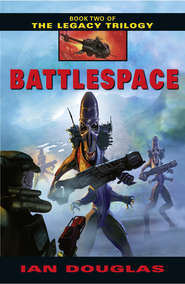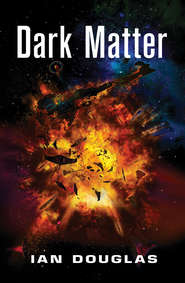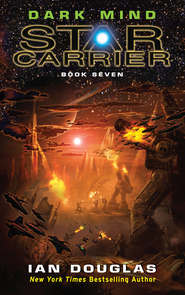По всем вопросам обращайтесь на: info@litportal.ru
(©) 2003-2024.
✖
The Complete Heritage Trilogy: Semper Mars, Luna Marine, Europa Strike
Настройки чтения
Размер шрифта
Высота строк
Поля
“And how is that going to help us?”
Gray drew a deep breath. “It’s a symbol, Mr. President.” He nodded toward the screen, where the destruction of the US Capitol Building was being played out again. “Most of their strikes, so far, have been against high-visibility, newsworthy targets. Public buildings. State capitols. Things with propaganda value, that demonstrate that we can’t protect ourselves from this kind of attack.”
The White House had been badly damaged several hours ago. A near miss had damaged the Washington Monument, too, though it was still standing.
“Go on.”
“The International Space Station is also a symbol, Mr. President. A station that passes over our heads every ninety minutes or so and proves that we can’t protect our interests in space…an area where America historically held a strong lead over everyone else.”
“Hell, we were giving up on space,” Harrel pointed out. “At least until we found that alien shit on Mars.”
“That ‘alien shit,’ as Mr. Harrel calls it, may well be the key to this whole war,” Gray said. “It’s Ken Morrow’s contention that Mars is the main reason the UN jumped us. Not Aztlan. And not US unwillingness to go along with the UN’s agenda.”
“I know,” the president replied. “He’s been telling me that every day now for the past week.” He shook his head. “Tell me, gentlemen. Is anything we find on Mars worth that?” He gestured at Braun’s oversize face on the wall screen.
“We won’t know that, Mr. President, until our people have a chance to excavate the site a bit farther,” Harrel said. “But it does appear that the UN forces on Mars launched this adventure because they wanted to shut us down there.”
“Shut us down?” Gray said, thoughtful. “They could have done that as soon as their troops reached Mars, seven months ago. I think our people might have found something specific, something the UN didn’t want broadcast. Otherwise, why wait until now?”
“They might’ve just been waiting until they were ready,” Harrel suggested.
“Maybe, but the attack seemed rushed. As though it was being hurried along by events elsewhere. Mr. President, I think we have to assume that our most important battle right now is the one on Mars.”
Markham gave a wan smile. “The one we can’t do anything about.”
“Well, sir, we can start by getting the ISS back. If the Marines win on Mars, we need a working spaceport on this end to pick them up when they return. The ISS is also the center of Spacenet, which handles all communications off of Earth. We’ll need to secure that if we’re to have a hope of finding out what’s going on up there.”
“Hence, Operation Freedom,” the president mused. “The problem is, gentlemen, that even if we get the space station back, it’ll be months before our people on Mars can return on the cycler, right? In the meantime, what am I supposed to tell the American people? That we’re sitting through this bombardment so our people on Mars can dig up rusty alien spaceships?”
“That’s why we’re emphasizing the propaganda value of the ISS op, sir,” Gray said. “You could think of it like the Doolittle bombing raid against Japan, a century ago. It won’t hurt the enemy materially that much, but it sure as hell will hurt his pride.”
“Mmm. That sort of gesture can only sustain us so far. We’ve got to hit the bastards back here on Earth, hit ’em hard, or else throw a big enough scare into them that they back off and leave us alone.”
“The Tenth Infantry Division has deployed from Fort Drum,” Gray pointed out, “and has been engaging the Quebeckers outside Plattsburgh Aerospace Force Base. We stand a good chance of winning that one, especially since the 380th Bomb Wing out of Plattsburgh has started hammering Montreal. We’re also holding the Mexicans and the Colombians at San Diego. Our reserves and the National Guard are almost at full mobilization. Once the enemy attacks run out of steam, we should be able to go over to the offensive, both in Quebec and in northern Mexico. We’ll also be able to start coordinating things with our allies. The Russians seem to be doing okay against the Manchurians. England is taking heavy cruise missile attacks from across the Channel, but they’re holding. We actually stand a very good chance of holding them at our borders, and once—”
“That’s just the problem, Admiral,” Markham interrupted. “We’ve got to do more than just hold them. We’ve got to hit back. Hard. Before they decide to escalate to something nastier.”
“It’s possible, Mr. President,” Harrel said softly, “that our hitting back harder would precipitate an escalation.”
“I know. So the secretary of state told me.” The president paused. “John Matloff offered me his resignation this morning. Did you know?”
“No, sir,” Gray and Harrel said, almost in unison. Gray was surprised. Matloff hadn’t struck him as the sort to make dramatic gestures, especially where his career was concerned.
“I refused it,” Markham said. “Told him I wasn’t going to let him start a stampede. The government has to be together on this. Present a united front. For the people. And for the rest of the world. Am I right?”
“Yes, Mr. President.” Again, they spoke almost as one.
“I’ve authorized Operation Freedom, Admiral Gray. I’m not sure how much help it’s going to be to us in the short term, but it’s a good long-term gamble, and you’re right about it being a symbol. We win a victory up there, in orbit, and we’re letting the world know we still have the high-tech know-how to command space. But…” He stopped suddenly, one finger raised for emphasis. “But. If Operation Freedom doesn’t come off as advertised, we are going to be in an extraordinarily vulnerable position. The people will see us throwing away lives and equipment in space when enemy forces are marching through our backyards and giving us one god awful shellacking. They might not sit still for that. I may be forced to sue for peace, while I still have the option. So I want you gentlemen to make this thing work. Clear?”
“Yes, sir.”
“Keep working at ways of intercepting those missiles. The people won’t support a government that can’t protect them.”
“Overall popular response has been good, Mr. President,” Harrel said. “Surprisingly good, under the circumstances. The bombardment seems to have united most of them.”
“I would remind the president,” Gray said, “that an outside attack like this usually doesn’t have the effect on the morale of the target population that the attackers hope. The Germans learned that when they tried to bomb England during the Blitz. We learned the same thing in Vietnam a generation later.”
“Agreed. But it’s been a long time since Americans have been involved directly in a war like this, gentlemen. Unless you count a few shells from U-boats and Japanese subs in World War II, we’ve never suffered a bombardment…and the last time enemy troops were on our soil was the War of 1812. These attacks on our government buildings and institutions are designed for three things, as I see it. They want to demonstrate they can hit us, and keep hitting us as long as they need to. They want to break our morale. And they want to drive a wedge into our people, between the Nationalists and the Internationalists. The Internationalist Party, you know, has already come out in favor of a negotiated truce and immediate incorporation into the UN World Government. They could gain a lot of converts if this bombardment goes on. If we can’t show the people a damned positive turn in the battle, and fast, well…” He didn’t finish the sentence.
“Operation Freedom is the way to go, sir,” Gray said quietly. “Once we have control of Earth orbit, we’ve got the high ground, as it were. The Hecate laser aboard Shepard Station proved its effectiveness this morning. We’ll be able to turn it against enemy launch sites…maybe hit those European arsenal ships that have been tossing cruise missiles at us from the North Atlantic. We might even consider laser attacks against their capitals…or against the UN building in Geneva.”
“Who’s on the Freedom op?”
“The Marine commandant himself is running the show, Mr. President. He’s already left for Cheyenne Mountain. The unit tagged for the mission is First Platoon, Alfa Company, First Marine Strike Battalion.”
“They’re good?”
“The best. They’re the unit that brought our people out of Mexico City. They’re at Vandenberg, where they’ve been training for orbital combat operations.”
“Who’s in command?”
“A Lieutenant Fuentes, sir. CO of the rescue team at the embassy.”
“Well, I hope to hell he can pull it off.”
“Fuentes will do it if anyone can, Mr. President.” Gray decided not to tell Markham that Carmen Fuentes was a woman. Sex had stopped being an issue in the American military decades ago, but even now there was the unspoken but very evident assumption in government and in the chain of command that a man was needed for a man’s work. So far as Gray was concerned, Fuentes had proved herself and then some at the US Embassy in Mexico City. Warhurst trusted her…and, more to the point, the men and women in her platoon trusted her. He wasn’t going to risk interfering with that.
He just hoped she had what it took to pull off her mission. Right now, it looked as though the very existence of the United States of America was hanging by a thread.
NINETEEN
TUESDAY, 12 JUNE: 1412 HOURS GMT
Star Eagle transport Michael
E. Thornton
LEO
0712 hours PDT
The Star Eagle Michael E. Thornton, a single-stage-to-orbit SCRAMjet transport, had cleared the lower reaches of Earth’s atmosphere and was accelerating now on her rockets, thundering through the fast-thinning traces of air toward the sunrise. Lieutenant Carmen Fuentes, encased in Class-One/Special armor and riding in what by now was effectively vacuum, couldn’t hear the rockets so much as feel them. The passenger module was a quick design that Marines jokingly referred to as “economy class,” with thin padding over hard steel skeletons of chairs.
It was not the most comfortable way to ride to orbit.
The last whispering rumble of the rocket engines died away, leaving Lieutenant Carmen Fuentes and the twenty-two men and women with her in the Star Eagle’s passenger compartment in the free-falling light-headedness of microgravity. The green light at the head of the compartment winked on, indicating that it was safe to move about. Fuentes unsnapped her harness, grabbed a handhold on the overhead, and pulled herself around to face her people.
“Listen up, everyone,” she said over the platoon channel. “I want all of you to stay strapped in. There’s nothing to see in this tin can, so you might as well stay buckled. You’ve all got your TD-patches, so you shouldn’t be spacesick. Any of you do feel sick, use your barf bags. Just remember, it’ll be a long time yet before we can unsuit.”











